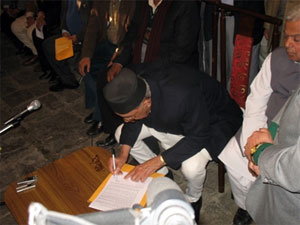|
|
| Prime Minister Girija Prasad Koirala shaking hands with Madhesi leaders after signing in the eight points agreements at Prime Minister\'s residence. |
To be sure, there are still uncertainties. More radical Madhesi groups have to be brought on board, and the militant outfits are still in the wilderness. In the east, there has been progress on autonomy talks with the Limbuwan and Khambuwan, but those groups are taking their cue from the Madhesis to push the government when it\'s weak.
Then there are the die-hard royals who want to prevent elections at all costs because it will set up a constituent assembly that will have as its first task the abolition of the kingship. There is evidence the king\'s supporters are using extreme Hindu groups from across the border to prolong the unrest in the tarai so that there would never be the right condition for polls. King Gyanendra\'s son-in-law was in Delhi earlier this month to lobby.
Playing the Hindu card in India has been a standard modus operandi for Nepal\'s monarchists who have used the emotional attachment among India\'s political elite for the retention of a Hindu monarchy in Nepal. In fact, in recent months the BJP and its hardliner backers in the VHP and RSS had been trying to portray the Indian government\'s involvement in the Nepal peace process as a failure.
|
|
Thursday\'s agreement also brings closure and clarity to a political transition that had dragged on for too long, and finally paves the way for elections. Now the country\'s focus can be on the elections.
Not everyone in the Madhes will be satisfied with the eight point agreement, and there will be elements in the hills who will feel that the government has given away too much. But a lot of these residual issues can be resolved by the elected 601-member constituent assembly. After all, that is it\'s job.
It will take time for the country to recover from economic and physical loss of the one-year turmoil in the tarai. But there is finally a chance to set right historic wrongs and forge a new beginning.




